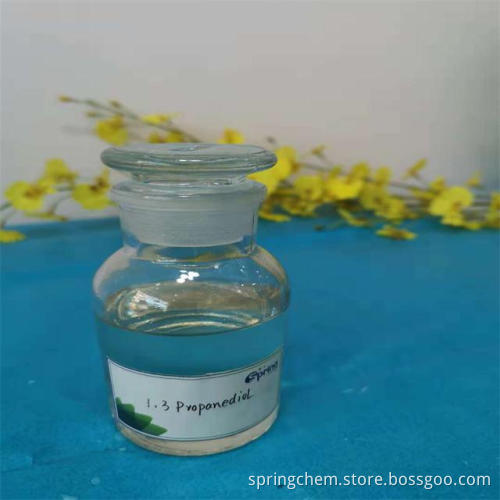
Preservative-boosters and humectant 13-Propanediol
- Payment Type:
- L/C, T/T, D/P, Paypal, Money Gram, Western Union
- Incoterm:
- FOB, CFR, CIF, EXW
- Min. Order:
- 200 Kilogram
- Min. Order:
- 200 Kilogram
- Delivery Time:
- 10 Days
- Transportation:
- Ocean, Land, Air
Your message must be between 20 to 2000 characters
Contact Now| Payment Type: | L/C,T/T,D/P,Paypal,Money Gram,Western Union |
|---|---|
| Incoterm: | FOB,CFR,CIF,EXW |
| Transportation: | Ocean,Land,Air |
1,3 Propanediol (referred to as Propanediol hereafter) is typically derived from corn, there are actually two distinct forms of PDO: 1,3 Propanediol and 1,2 Propanediol, also known as propylene glycol (PG). 1,2 Propanediol is a natural, green propylene glycol.
Propanediol is a natural, skin-friendly preservative-boosting humectant for all kinds of formulations. It is made from renewable corn sugar fermentation. Has excellent sensory characteristics & is environmentally sustainable. It is naturally derived.
Propanediol is the organic compound with the formula CH2(CH2OH)2. This three-carbon diol is a colorless viscous liquid that is miscible with water
It is mainly used as a building block in the production of polymers such as polytrimethylene terephthalate.
Propanediol can be formulated into a variety of industrial products including composites, adhesives, laminates, coatings, moldings, aliphatic polyesters, copolyesters. It is also a solvent and used as an antifreeze and in wood paint.
Propanediol is mainly produced by the hydration of acrolein. An alternative route involves the hydroformylation of ethylene oxide to afford 3-hydroxypropionaldehyde. The aldehyde is subsequently hydrogenated to give Propanediol. Biotechnological routes are also known
In all products, it decreases the freezing point and increases stability in freeze/thaw and heated tests.
Related Keywords









